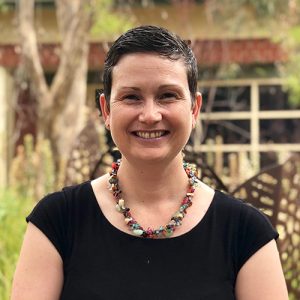
Dr Jo Lane works at the Research School of Population Health, Australian National University (ANU). She is part of large multidisciplinary team called Our Health in Our Hands (OHIOH). This is a very diverse team of scientists and clinicians working closely with people living with MS to tackle barriers to the introduction of personalised medicine and improve the clinical management and overall health and wellbeing of people living with MS.
The Ian Ballard Travel Grant will provide Dr Lane with the opportunity to collaborate with two exemplary academics at the forefront of MS research in the US and Canada. She will be travelling to the Johns Hopkins Multiple Sclerosis Centre USA and the University of British Columbia Canada for a period of nearly 3 weeks.
At the Johns Hopkins Multiple Sclerosis Centre, she will be collaborating on environmental risk factors and MS, and their use of apps and other technologies to monitor MS disease activity and progression to inform, complement and optimise similar projects within OHIOH. From there, she will be going to the University of British Columbia to collaborate on a manuscript. While she is in North America, she will also be presenting her work at the prestigious Americas Committee for Treatment and Research in Multiple Sclerosis (ACTRIMS) Forum.
The travel award will allow Dr Lane to develop complementary and novel collaborations to improve the detection of MS disease and/or progression and optimise personalised medicine in MS.
Updated 22 January 2020
Updated: 20 January, 2020

Laboratory research that investigates scientific theories behind the possible causes, disease progression, ways to diagnose and better treat MS.

Research that builds on fundamental scientific research to develop new therapies, medical procedures or diagnostics and advances it closer to the clinic.

Clinical research is the culmination of fundamental and translational research turning those research discoveries into treatments and interventions for people with MS.

